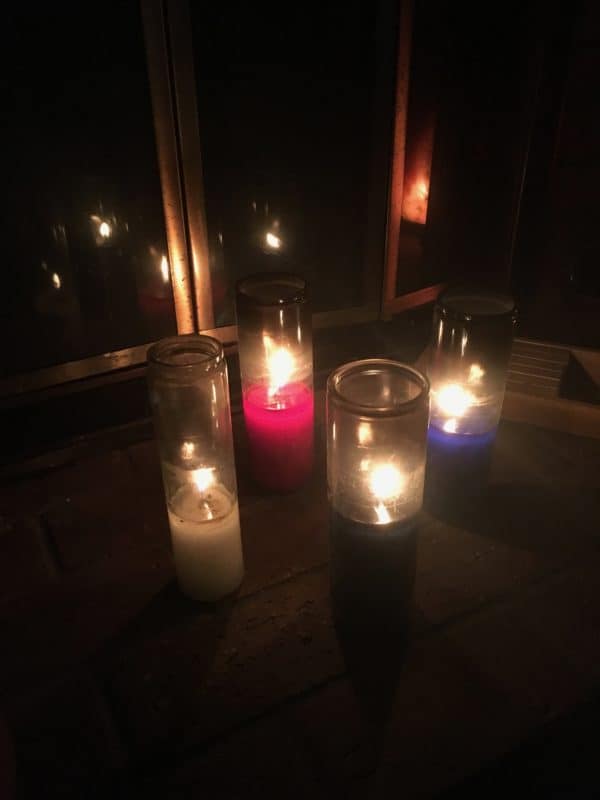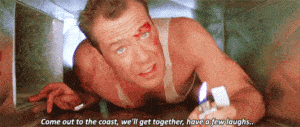
Well, we made it through the darkest night of the year. May we rise from this point, steadily and in unison.

Well, we made it through the darkest night of the year. May we rise from this point, steadily and in unison.
 Happy Yule, everyone! The house is quiet, since the dogs have plundered their puzzle feeders and are now exhausted by such demanding mental work. Miss B’s in for a run with me as soon as I finish this post, though, which means she’ll be doubly tired.
Happy Yule, everyone! The house is quiet, since the dogs have plundered their puzzle feeders and are now exhausted by such demanding mental work. Miss B’s in for a run with me as soon as I finish this post, though, which means she’ll be doubly tired.
This morning there was freezing fog, it’s bound to be slick out there. The longest night of the year is approaching. I used to hold vigil all night to greet the rebirth of the sun, but these days I’m too old and the candles on the hearth will do it for me. When the Princess comes home from work we’ll probably put the tree up, and the holiday baking will continue. Yesterday the Princess made this cake, and we were all in a sugar coma after dinner. The crackle-bits themselves stick to one’s teeth in a most fetching manner.
That’s about it for the holiday, I think. We’re very quiet, and it’s almost time for me to take a break from blogging until January. I’ve produced a lot of work this past year, and it irks me to think of how many more stories I could have told if the world wasn’t such a trashfire right now. I suppose I’m addicted to hope, I cannot stop practicing it even in the face of this overwhelming evidence.
Anyway, it’s time to get out the door. May your solstice be happy, healthy, and full of all good things. May the sun return.
 Just because you’ve always gone to that waterhole doesn’t mean you have to keep doing it.
Just because you’ve always gone to that waterhole doesn’t mean you have to keep doing it.
…Let me back up.
It’s that time of year again, holiday time. Decorated dryad-corpses in living rooms, cranky children in stores overwhelmed by colorful advertising, frazzled drivers ramming each other in parking lots with shopping trolleys AND cars. Also, fudge!
I love fudge.
This is also the time of year I hear a lot of people dreading the inevitable family gatherings. I often make an announcement on social media concerning this, but I figured this year I’d post it here as well.
Here is your yearly reminder that you don’t have to go to that holiday gathering if you don’t want to. NOBODY WILL DIE IF YOU DON’T GO TO THAT FAMILY GATHERING. You can stay home and save yourself the grief.
See, toxic people have a ball this time of year, because not only do they get to ramp up the drama and get that emotional jolt, but their prey will come to the same waterhole and offer easy access. It’s a moving buffet for interpersonal predators this time of year. Plus, there are enablers who will pressure the prey to come to that danger-infested waterhole, because “it’s what we do every year” and “family” and “togetherness” and “you don’t want to ruin it for everyone” and “just get along” and “maybe it’ll be different this time.” Implicit in this, too, is the enablers realizing very well that if the regular prey isn’t there, a toxic predator will turn on someone else–very likely the enabler themselves.
You do not have to put yourself through that. There are other waterholes without predators, and you can visit them for your holiday jibjabber and baked goods. You can even stay home, bake yourself a bunch of fun stuff, and go to bed early, which is my favorite way to spend any holiday.
If you’r looking for permission not to peel your own skin off or stake yourself out in the blazing sun of family drama, consider this it. You do not have to do this thing that hurts you. You do not have to allow predators and toxic people or even just garden-variety family bigots access to you, your emotional effort, your time.
“But I’ll feel guilty!” I hear a lot of people say.
So you’ll feel guilty. Which is worse–a little bit of guilt, or enduring the gauntlet at that particular infested waterhole? My life got a lot better when I realized enduring the guilt I’d been socialized to feel at enforcing my boundaries was way, way, WAY easier than suffering the fallout from making myself available to abusers, predators, and those who were just used to me performing emotional labour at the drop of a hat.
I’m over forty, I don’t have time for that bullshit, I have no fucks left to give, and if a small amount of guilt is the price I pay for holidays that don’t leave me marooned in an emotional mudhole, I’ll pay it and go on with my life whistling.
If you need permission, consider this it. If you need to know it’s okay to make that choice, I’m telling you, it’s okay.
Happy holidays.

I took a break from Upham to start Hilaire Belloc‘s The French Revolution. He blames Carnot for everything, really, and as a Frenchman I suppose he has the right. But his comments on Marat give me a great deal of thought.
“He was often right when he denounced a political intriguer: he often would have sacrificed a victim not unjustly condemned, he often discovered an agent partially responsible, and even the violent solutions that he suggested were not always impracticable. But it was the prime error of his tortured mind that beyond victims, and sudden violent clutches at the success of democracy, there was nothing else he could conceive. He was incapable of allowing for imperfections, for stupidities, for the misapprehension of mind by mind, for the mere action of time, and for all that renders human life infinitely complex and infinitely adjustable.”
Excerpt From: Hilaire Belloc. “The French Revolution”.
His two short portraits of Marat and Robespierre are bookends of a sort; they present personalities immediately recognizable in the age of social media as well. Plus ça change, and all that.
Belloc was a Catholic apologist, an anti-Semite, didn’t believe in evolution, and probably would be a Gamergater if alive today, so if you want to read, be warned. I find him funny, but it’s the raging bigots who have a gift for comedy you have to watch out for. That aside, I’m always game for French Revolution histories, and he’s witty enough in places to be a smooth read. When I finish it I’ll go back to Upham; it’s not quite a palate cleanser so much as a different taste to provide complexity.

My fascination with bulldozers and differs is akin to my fascination with gas meters, with the added wonder of “hands no bigger than mine built this THING, this huge powerful THING.” And yet, even the largest machine can be defeated by a small thing. We are so powerful, and so fragile at once. Which is a good thing. Without the fragility, power becomes corruption in a heartbeat.
Yes, I’m feeling philosophical this morning. How could you tell?
I finished the zero draft of the first Combine’s Shadow book last night. So today is kind of an off-day, though I still have to get out the door for a run. God knows I’m feeling the pressure to get a whole chunk of Beast of Wonder out of my head today, too.
Every once in a while I get a rash of people asking “what’s a zero draft?” so I thought I might as well do a whole post on it, since I just finished one and I’m pretty sure I’m going to have another soon. (Beast of Wonder really, really wants to be written now, and I need it out of my head.)
It’s been said that all good writing is rewriting, and like all old chestnuts, it contains a grain of truth. Certainly there are occasions when a chunk of text falls out of my head and needs only minimal polishing before it’s ready for primetime, when I fall into a fugue state and churn out something beautiful. (The Muse does have to give me random rewards in order to keep me addicted, after all.) Those gifts are Easter-egg sprinkled through every draft, hidden hinges and visible ones for the story to hang on.
Zero draft means the work is done. It has the beginning, middle, end, there aren’t any places saying [[shit happens here]] or [[why isn’t this working, figure out the muppet here]] or [[jesus christ I have to kill this character soon]] or, one of my favorites, [[sex scene here?]]. It’s in recognizable book/short story/novella form; the corpse is whole and laid on the table. Celebrate, get a beverage of your choice, soak up the congrats of all your writer friends. You’ve given birth!
Now comes the hard part. Nobody else sees this draft. Oh, no. Are you kidding? It’s not even ready for my writing partner or beta readers yet.
The zero draft is the raw steaming lump of creativity. I set it aside, for at least a week. More difficult works sometimes have to marinate for longer. This serves two purposes: it helps ease the snapback, and it gives some slight but critical emotional distance from the big, messy word-baby you’ve just laid. You need that distance in order to make the word-baby better, prettier, more appealing, truer to its shape and intention.
Once it’s marinated for a little bit, you can go back and do the initial revision pass. You can fix typos, you can trim and craft better sentences, do continuity checks–basically, the initial pass is for arranging the corpse prettily on the table, embalming it, fixing structural problems, changing your dialogue tags to action or description tags, and the like. After that pass, it becomes a first draft.
Now other people–writing partner, beta readers, etc.–can see it. Now you can let it marinate for a little while longer before another revision pass if you can tell it needs more. A zero draft is the skeleton; a first draft is that skeleton with padding and clothing added. (Yes, I’m gleefully abusing metaphors here to make a point. You’d think I was a writer.) Work doesn’t stop at a first draft–I know writers who get to at least the third before they even consider letting an agent or editor near it. I tend to work hot and lean even in my first drafts, so I need agent/editor feedback on where the lacunae are, those things I can see so clearly in my head I forget the reader doesn’t have that image as well. It’s rare that I keep a book until the second or third draft.
Why don’t I call a zero a first draft? Because it’s finished, yes, but it’s not quite arranged, painted, or aesthetically where I want it. The brute work of typing is done, but it’s the cut and polish that makes it better. Still, the zero is a thing to celebrate. You’ve got to give yourself a break and a reward or two for finishing the damn story before you can gather the energy to make the corpse ready for the viewing.
It doesn’t mean the work is over, but you’ve got to take the good things where you find them.
I fell asleep last night reading Charles Wentworth Upham on the Salem witch trials. First published in 1867, the work is prey to racism common at the time, though Upham seems rather uneasy at the genocide of the Native Americans. He also doesn’t mention chattel slavery in the colonial period more than glancingly–of course, with the Civil War reaching its final bloody conclusion two years earlier, he may have thought it indelicate to refer to. There’s also a regrettable lack of women in his text–they’re wives or daughters, rarely even rating their own name. It will be interesting to see how he approaches the actual trial events themselves.
Right now (well, a good 200 pages in) he’s carefully laying out all the property disputes that set the stage for the witchcraft fury, untangling the resentments that no doubt gave it dry fuel. Surprisingly, for a man who no doubt had several Confederate sympathies, he seems to be trying to be…fair and even-handed? Kind of? At least, he has the idea that we cannot point out a mote of dust in historical eyes without dealing with the beams in our own to some extent.
“They did not understand the great truth which Hugh Peters preached to Parliament, “Why,” said he, “cannot Christians differ, and yet be friends? All children should be fed, though they have different faces and shapes: unity, not uniformity, is the Christian word.” They admitted no such notion as this. They thought uniformity the only basis of unity. They meant to make and to keep this a country after their own pattern, a Congregational, Puritan, Cambridge-Platform-man’s country. The time has not yet come when we can lift up clean hands against them. Two successive chief-magistrates of the United States have opened the door and signified to one-eighth part of our whole people, that it will be best for them to walk out. So long as the doctrine is maintained that this is the white man’s country, or any man’s, or any class or kind of men’s country, it becomes us to close our lips against denunciation of the Fathers of New England because they tried to keep the country to themselves.” Excerpt From: Charles Wentworth Upham. “Salem Witchcraft, Volumes I and II.” iBooks.
I’d be more impressed if he wasn’t the guy who got Hawthorne dismissed from the Salem customs-house, or if he hadn’t gotten Jones Very institutionalized. I’d be truly impressed if he went the extra step and denounced genocide and chattel slavery in America as the cancer it was, and remains. Still, the book is public domain, and it remains a good and careful tracing of a seminal event in American history.
One of the side effects of reading about the Puritans is a distressing feeling of having sinned just by breathing. (This was particularly marked when I read Cotton Mather and watched The Witch in short order; Puritanism is somewhat of a virus, and its infection of the American body politic is insidious.) This morning’s coffee felt like a stolen pleasure, hence all the more intensely enjoyable. I’m going to need a palate cleanser after going from Serge’s Russia: Twenty Years After straight to Upham. Maybe that latest Bernie Gunther novel.
*wanders away, muttering about the Colonial Era*